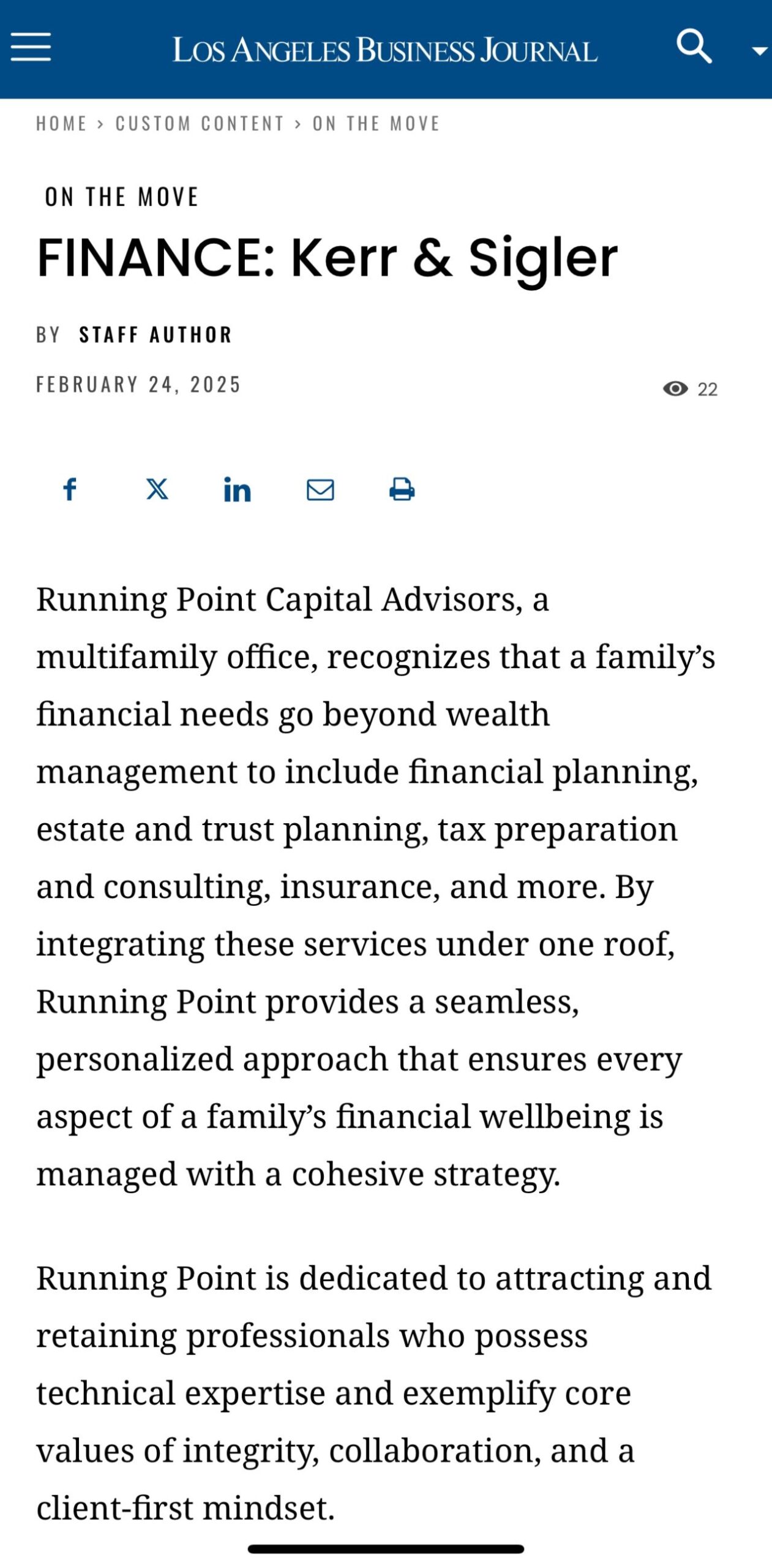We at Running Point Capital Advisors love diving into new tax legislation to better understand the impact it may have to our clients’ financial well-being. Though some may find tax law to be somewhat mundane, we find it opens our eyes to many creative aspects of wealth management. Sometimes the unexpected changes we face help us find opportunities, especially in challenging times.
Proposition 19, approved by California voters last November, is a great case in point. Many of our clients who own California real estate want to know how to strategize around Proposition 19 in terms of keeping their wealth in the family. At its highest level, Proposition 19 is worse for intrafamily transfers and marginally better for seniors who wish to sell their home and stay in California. It definitely raises questions and invites exploration of creative strategies. We will address both here.
A Brief History of California Property Tax Laws
Dating back to 1978, Proposition 13 gave California property owners over age 55 the right to transfer a primary residence of any value to their children or grandchildren, either during their lifetime or at death, while still preserving the property’s tax base. In other words, their children would pay essentially the same property tax as their parents/grandparents are currently paying
Now, under Proposition 19—which took effect on February 16—only the transfer of a primary residence up to the current assessed value from your property tax bill plus $1 million (as annually adjusted) qualifies for the exclusion from reassessment.
The new law also requires that the child/children occupy the home as a personal residence within one year. Real estate transfers other than a primary residence are no longer eligible for exclusion. So, what does this mean for the next in line to the home?
Meet Allan and Ann Aarp of Manhattan Beach
Let’s walk through a hypothetical example of the potential impact. Allan and Ann Aarp both recently turned 55 and are considered “seniors” now.[1] They have enough income from the sale of Ann’s law practice to live comfortably for the rest of their lives. They purchased their home back in 2000 for $500,000. The property tax is currently $8,000 per year (indexed by 2%).
Today, the Aarps’ property is worth $3 million with no mortgage and has a property tax base of $800,000. Allan and Ann decide to transfer the home to their son, Bob, and he immediately moves in. Under Prop 19, he can exclude the current tax value of $800,000, plus an additional $1 million from reassessment upon transfer, which would result in $1.2 million being subject to reassessment.
Let’s assume this results in an additional $14,400 in annual property taxes for a total of $22,400 per year.[2] Under Prop 13, Bob would only have to pay in property tax the $8,000 his parents were paying when they transferred title. So the new law makes quite a difference in what descendants can expect to pay in property taxes on their family homes.
Continuing with the $3 million home value example above, if Bob took receipt of the property and decided to rent it, the entire property would be reassessed at the full current value—meaning he would have to pay $36,000 in property tax, using the rates above. This would require him to seek higher rent from his tenants to account for the increased property tax. Therefore it may not make sense for Bob to keep the property.
To make matters worse, by Allan and Ann making a lifetime transfer to their son, Bob would also inherit the cost basis of $500,000 from his parents. Then, if he were to sell the home, he would face a hefty capital gains tax of approximately $845,000 on a $2.5 million gain.[3] Instead, Allan and Ann could simply keep the home in their name or in a revocable living trust, and Bob and his family could live in it during his parents’ lifetime—and preserve the current property tax rate of $8,000.
If Allan and Ann fall below the current $23.4 million estate tax exemption ($11.7 million per spouse), they could hold the home until their death and then transfer it to Bob. If Allan and Ann pass away in 30 years at age 85, and the property is worth $5 million at that time, Bob would face a step-up in cost basis from $500,000 to the current market value of $5 million at the time of their passing. So effectively, he could sell the house for $5 million and pay no tax.
The silver lining of the other provisions set forth in Proposition 19 is that it is supposed to free up current limitations of the sale of property for seniors. Seniors can now buy any home in California of any value up to three times in their lifetime and maintain their original property tax base. So, assuming they don’t flee to Nevada or Florida to escape California’s higher state income tax rates, Allan and Ann can sell their home and buy a new one, and still preserve their tax basis of $8,000 as long as the purchase price of the new home is equal or less than the sale value of the old home. If they buy a home of higher value then the incremental value would be assessed at normal rates.
Tax Planning Strategies
As mentioned earlier, Prop 19 applies specifically to property taxes. However, there are intersecting income tax concepts that should be considered. As Running Point’s Tax Manager, Todd has some thoughts on this.
Let’s say the Aarps’ estate exceeds the $23.4 million estate exemption and there is a need to make a lifetime transfer of assets to avoid the 40% estate tax. Todd points out a potential strategy that could enable the descendants to keep the properties and avoid property tax reassessments, albeit with risks. It should be noted that this is not tax advice, but rather a hypothetical discussion aimed at finding opportunities to address issues associated with Prop 19.
The Aarps may create an entity while they are still alive, such as an LLC, and utilize this as a vehicle for the property transfers. Theoretically this would be accomplished in a series of steps:
First, the Aarps place their properties into an LLC (LLC A). This would not trigger a reassessment. Next, the parents gift 50% of the LLC interest to their descendants before they pass away. Again, this does not trigger a reassessment so long as there is not a change in ownership—i.e., no more than 50% of LLC interest is transferred (50% rule) [4]. This is true even if done after the new law takes effect because this is a transfer of interest in the LLC, and not a transfer of the real property within the LLC itself.[5] If the parents gifted 51% of the LLC, the property could be reassessed.
How does the remaining 50% interest in the LLC get transferred to their descendants without violating the 50% rule? This is where things get tricky and can result in reassessment of the underlying property if not done correctly. Remember, we’re not sharing this as advice. This is not prescriptive. It’s an illustration of a possible opportunity. The Aarps gift their remaining LLC interest to their descendants as “tenants in common,” an arrangement where all persons in a group own the property equally, or in other words, no one can claim ownership to any specific item of property. Legally they are determined to be original co-owners, thus maintaining the 50% rule, and avoiding reassessment.[6]
The fourth step is for the tenants in common to immediately transfer this 50% into a second LLC (LLC B). Once the Aarps pass away, LLC B transfers the assets to LLC A, bringing everything together under the descendants’ ownership in LLC A, without a property tax reassessment or the necessity for one of the children to maintain the home as a primary residence.
There is still a step-up in the tax basis (separate from assessed basis) to the fair market value on the date of passing for only the original 50% transferred at death from LLC A, so it is important to consider the tradeoff of forgoing half of the step-up versus property tax reassessment. It is highly recommended that you discuss all of the potential ramifications with your attorney and tax advisors before adopting such a strategy, given the inherent risks involved.
Pulling It All Together
We at Running Point see well-structured real estate as a viable component of investment portfolios. Running Point’s Chief Investment Officer, Michael Ashley Schulman, CFA, shares this perspective: “We generally see real estate as a desirable core asset within long-term investment portfolios. Often we diversify clients out of state—for example, Utah, Colorado, Texas, South Carolina—into attractive residential, warehouse, or bespoke opportunities with tax and depreciation benefits.” Michael actively vets real estate investments such as opportunity zone deals, 1031 exchanges, and private real estate offerings for our families.
Proposition 19 represents one piece of the real estate and investment puzzle. Equally important are other tax rates currently under evaluation. California is reviewing a bill that if passed would raise the top state income tax rate from 13.3% to 16.8%. At the federal level, President Biden’s tax plan calls for an income tax increase from 37% to 39.6% on Americans making over $400,000, a capital gains tax increase from 20% to 39.6% for taxpayers above $1 million in income, an estate tax increase from 40% to 45%, and an estate exemption decrease from $11.7 million per spouse/$23.4 million per couple to $3.5 million per spouse/$7 million per couple.
Develop a Course of Action
What strategies make the most sense for a family? The short answer: It depends. Each family has different financial circumstances and different family values. At Running Point Capital Advisors, our clients benefit from an experienced multidisciplinary group of professionals. We start by listening to gain a clear understanding of your values, goals, and objectives. We work together to develop a comprehensive financial plan to help you accomplish, implement, and monitor those objectives.
Planning can get complicated. But it does not have to be. Running Point places financial, tax, and legal experts by your side to navigate Proposition 19 and other financial headwinds. We analyze potential solutions and focus on the core strategies that matter most to you and your family.
Tammy Trenta Knowlton and Todd Stern
[1] Proposition 19 refers to 55-year-olds as seniors. They must have missed the South Bay memo that 55 is the new 40.
[2] Based on an assumed property tax rate of 1.2%
[3] Federal capital gains tax 20%, State tax 10% (assumed), net investment income tax 3.8%.
[4] Rev. & Tax. Code, § 64, subd. (d)
[5] Rev. & Tax. Code, § 63.1, subd. (c)(8)
[6] Rev. & Tax. Code, § 62, subd. (a)(1)
Disclosure: The opinions expressed are those of Running Point Capital Advisors, LLC (Running Point) and are subject to change without notice. The opinions referenced are as of the date of publication, may be modified due to changes in the market or economic conditions, and may not necessarily come to pass. Forward looking statements cannot be guaranteed. Running Point is an investment adviser registered with the U.S. Securities and Exchange Commission. Registration does not imply a certain level of skill or training. More information about Running Point’s investment advisory services and fees can be found in its Form ADV Part 2, which is available upon request. RP-21-03


